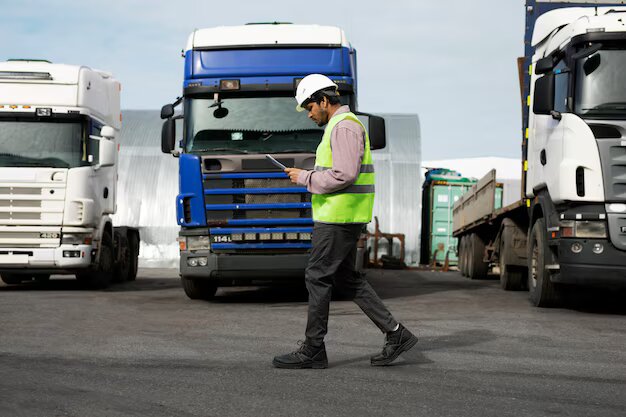The rapidly changing world of logistics, transportation, and communication is where dispatcher services lie at the heart of operational efficiency. From coordinating freight transportation, emergency response teams, and rideshare drivers, it all boils down to having a seamless communication and execution process. This blog talks about the vital functions, benefits, and challenges of dispatcher services and their role in the future of various industries.
A dispatcher service refers to a central hub for all forms of communication and coordination between many different operations. It provides central management of schedules and assigns tasks, monitors live feeds of progress, and reacts to unexpected problems or changes that occur in any of these operations. Such roles include logistics, emergency services, public transportation, among many others. Their basic mission is to distribute the proper resources in a highly effective manner so that their operation proceeds smoothly.
For instance, in logistics, the dispatchers are responsible for coordinating the movement of trucks to ensure timely delivery and optimize routes to reduce fuel costs. In emergency services, the dispatchers will allocate ambulances, fire trucks, or police units to respond to incidents in the shortest time possible.
Key Duties of Dispatchers
Task Allocation
The dispatcher allocates tasks and routes to drivers, workers, or teams according to priority and availability. This ensures that high-priority tasks are addressed promptly.
Real-Time Communication
The heart of dispatcher services is effective communication. Dispatchers pass instructions, updates, and changes to personnel in the field, and in return, they receive feedback in real-time to alter plans when necessary.
Route Optimization
Advanced software tools are utilized by dispatchers to optimize routes, hence saving time and cutting down costs. This is important in various industries, for example, logistics and ridesharing.
Crisis Management
Dispatchers handle emergencies like breakdowns or unforeseen delays with ease. They easily adjust schedules and deploy backup resources to minimize such disruptions.
Monitoring and Reporting
Dispatchers monitor the operations through GPS systems to ensure the efficient use of resources. They also prepare reports that help in analyzing performance and establishing areas for improvement.
Advantages of Dispatcher Services
Operational Efficiency
dispatcher services help boost productivity in the management of schedules, resources, and communication, therefore cutting down on instances of downtime and maximizing utilization of assets.
Cost Reduction
It reduces fuel usage and labour and maintenance expenses with the efficient planning of routes and distribution of resources.
Satisfying Customers
They increase customer satisfaction levels due to timely delivery. This helps a logistics company make constant deliveries, ensuring customer confidence.
Crisis Management
Save one, reduce critical loss in emergencies due to instantaneous and prompt decision-making of a dispatcher. For instance, in EMS, the responsibility of sending the closest ambulances to patients goes to the dispatchers who are responsible for alerting appropriate emergency services.
Data Analytical Insights
Now-a-days, data analytics also helps dispatcher systems track an organization's operational performance thereby helping organizations make effective improvements.
Challenges to a dispatcher service
Despite this essential role, dispatcher services meet several challenges:
The stresses related to the job
Dispatchers work in high-pressure environments where split-second decisions can have serious consequences. Handling multiple tasks at the same time can cause stress and burnout.
Technological Dependence
Technology increases efficiency but also creates vulnerabilities. System failures or cybersecurity breaches can disrupt operations.
Communication Barriers
Miscommunication between dispatchers and field personnel can lead to delays or errors. Clear and concise communication is necessary to avoid misunderstandings.
Unpredictable Variables
Weather conditions, traffic congestion, or equipment failures can be some of the factors that may alter plans, and dispatchers need to be flexible and resourceful.
Role of Technology in Dispatcher Services
Technology has played a significant role in modernizing dispatcher services. Advanced tools such as GPS tracking, route optimization software, and real-time communication platforms have transformed the way dispatchers operate.
Automation and AI
Automation tools can deal with redundant tasks like scheduling and route planning so that the dispatchers are free to focus on other complex activities. AI-powered systems analyze huge amounts of data for predicting and preventing potential disturbances.
Cloud-Based Solutions
Cloud-based dispatcher software lets organizations access real-time data from anywhere, making them more flexible and collaborative.
Mobile Applications
Mobile applications allow the smooth communication of dispatchers with field personnel to ensure the instant receipt of updates and instructions.
Data Analytics
Analytics tools provide insights into operational performance, helping organizations identify trends, optimize processes, and improve efficiency.
Future Trends in Dispatcher Services
As industries evolve, dispatcher services are likely to undergo significant transformations. Some key trends include:
Integration with IoT
The Internet of Things (IoT) will enable real-time monitoring of vehicles, equipment, and personnel, providing dispatchers with comprehensive visibility into operations.
Enhanced AI Capabilities
AI will increasingly be used for predictive analysis, allowing dispatchers to predict problems ahead of time and make prescriptive decisions.
Sustainability
Dispatcher services will work with green practices, like streamlining routes to reduce carbon usage and incorporating electric vehicles in fleets.
Remote Dispatch
The remote work wave will allow dispatchers to remotely manage operations, making full use of cloud-based applications and virtual communication tools.
Conclusion
Effective operations in many industries are based on dispatcher services. Dispatchers ensure efficient resource allocation, clear communication, and quick response to crises. Therefore, they contribute to the success of an organization and satisfaction of its customers. Challenges like stress and technological dependence are present, but technological advancement is promising to address these problems and open new doors.
The more the industries take the digital transformation, the more vital will be the role of dispatcher services. Organizations that invest in more advanced dispatcher tools and training will be better prepared to navigate the complexities of modern operations and achieve long-term success.

No comments:
Post a Comment